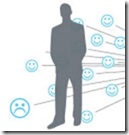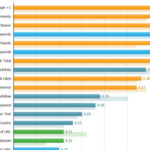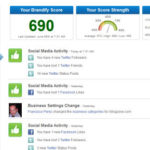I think that the answer to this question is pretty obvious and really does not need any further digging. However, if you insist, here is a quick excerpt of the words definition (via Wikipedia).
Reputation is the opinion (more technically, a social evaluation) of the group of entities toward a person, a group of people, or an organization on a certain criterion. It is an important factor in many fields, such as education, business, online communities or social status. Reputation can be considered as a component of the identity as defined by others.
For offline businesses, having a good reputation matters a lot. If you have a good reputation, the “word of mouth” factor spreads easily like crazy and satisfied clients keep coming back, while potential new customers arrives “knocking on your door”. In certain occasions some customers may even boast about using your products or services, as it can be considered a sort of publicity and gives them an edge from someone who does not (endorsements).
To exemplify, a friend of mine recently purchased and iPad 2. While we were together with a bunch of other people together at his house, he deliberately left the device on a place where everyone can see it. He literally was boasting about having the “best” in the world. Not only he was talking about his new shinny iPad 2, he was also publicizing the store where he bought it from and what a great deal they made him, the support, the friendliness of the sales people, the works. That guy is “free” advertising and one that is talking positively about everything. He was a happy man. Are you following? I’m sure you are…
You see, as a buyer he was happy. He knew that the device he just bought was backed by a company with solid credentials and all that. There might be “another” device that is equally good and perhaps even cheaper, but as he says, it is not an iPad. Which brings me to the question, will you buy something from someone whom you never heard about before, not recommended by anyone you trust, and without credentials? Easy answer, right?
Right, and this is particularly true (if not more) on the online world. Building reputation is not easy and getting endorsements from equally credible people or organizations is something you should be always working on as it is probably one of the most important factors in doing business online. You will get tired of seeing many people saying no traffic = no money (me included). Well, here’s another one for you, bad reputation = dump you current business and reset everything from scratch (that’s worst).
How Do You Know If You/Your Website Has Good Reputation?
 Really, and above all, you should be the first to know if you are “behaving” yourself up to the best standards and practices of having a presence online. Are you building relationships, are you providing useful content, are you helping others, are you promoting the best possible way your products and services, are you…, and the list goes on.
Really, and above all, you should be the first to know if you are “behaving” yourself up to the best standards and practices of having a presence online. Are you building relationships, are you providing useful content, are you helping others, are you promoting the best possible way your products and services, are you…, and the list goes on.
I won’t blabber about this too much here as you can, in addition, easily find articles on reliable sources that provides information about the subject matter. Find them, read them, understand them and finally, TAKE ACTION.
Tools or Services That (Can) Help
If you notice, in brackets, I say “can” because many will probably say, its useless or what is it good for, etc. I can easily give an example about Klout, MozRank, PR and Alexa, were many debate about its usefulness, importance, accuracy and all that. The hard truth is, there are people who rely on them and this is what matters. Advertisers or potential customers have different methods of conducting their analysis as to where they think they should advertise or make a purchase from. The more “positive” signals you have, the better. Will you advertise or buy something on a website that has an Alexa of 15 million and a gray PR toolbar, with the owner having a zero Klout? NO. You will probably be more interested in websites that has better numbers for sure. Why? Because they are signals, which can be indicators of your reputation.
In addition, if you are one of those that worries about SEO and getting more organic traffic, you should know that most of these sources are “first time” visitors and for them, you are a complete stranger. You can have the best “sales pitch” in the world, quality content, a great theme, fast loading website, etc., but trust me, they won’t buy until they dig a little more about you or whatever it is you are selling.
How Do You “boost” Your Reputation?
 No advice is better than “building relationships and surrounding yourself with trusted people”. The social networks are out there and all you have to do is use them, properly. If you have satisfied customers, ask them to provide testimonials. If you have business partners, collaborate with each other to boost your credibility (and theirs too). This is very powerful in the online world. Why do you think the A-Listers “cross” reference themselves with each other?
No advice is better than “building relationships and surrounding yourself with trusted people”. The social networks are out there and all you have to do is use them, properly. If you have satisfied customers, ask them to provide testimonials. If you have business partners, collaborate with each other to boost your credibility (and theirs too). This is very powerful in the online world. Why do you think the A-Listers “cross” reference themselves with each other?
Also, make sure that your website is “safe” for browsing. Safe for children, no SPAMMY links, no malware or malicious codes installed, etc.
Other forms of building reputation.
Alexa: Here we go again :). As I said, many people rely on it, so get your website reviewed as much as possible. The more reviews your website has, the better.
PostRank: PostRank’s platform tracks where and how users engage, and what they pay attention to — in real-time. Perhaps one of the most popular social engagement data measurement service currently available. PostRank measures user activities, indicating the relevance and influence of a site, story, or author.
WOT: The “website of trust”. Just get in there and don’t worry about the badge thing as they will charge you for it. While you will again debate about their methods, truth is, having a poor reputation there can make a difference. Last year, I got an order cancelled from a client that said, “sorry, your website’s WOT is not good enough, and I don’t want to risk my own reputation”. Needless to say that I got very worried. Head over there and YES, one guy, just one, who probably did not like me much (don’t know why, lol), rated my site as “unsafe for children”! To make this story short, if it were not for a friend of mine that assembled an A-Team and went over there to my rescue, that rating would have never left the red zone (all better now). Thanks btw, @HollyJahangiri, for the push :).
Klout: As defined by their developers – “The Klout Score is the measurement of your overall online influence. The scores range from 1 to 100 with higher scores representing a wider and stronger sphere of influence. Klout uses over 35 variables on Facebook and Twitter to measure True Reach, Amplification Probability, and Network Score.”
A friend of mine Ileane, has recently wrote about adding Klout to your social profile, so just head over there to find out more about it. No need of repeating it here.
LinkedIn: As you may already know, LinkedIn is known for being one of the best social networks for professional and like minded people. If you are not there yet, you should and if you are, build connections and get those “recommendations” in. They make a big difference.
AdAge Power150: The Power 150 is a daily ranking of the top English-language marketing blogs in the world, as developed by marketing executive and blogger, Todd Andrlik. Although they call it Power150, it currently ranks hundreds of blogs written about pretty much every imaginable marketing discipline (as of today 1152 are ranked). Getting in there is not easy (took me almost a year since submission), but once its there, it is an indicator that your website is at the very least, reliable. The ranking system they use is a combination of several factors, which include, PostRank, ToddIndex, Yahoo Inbound, Alexa (again), and more.
Webutation: Relatively new to me, but the website seems to be gaining momentum and is getting a lot of buzz. The source of information they use is a combination of WOT, Google SafeBrowsing, , users feedback and more. Don’t know about you, but in my experience, sometimes it is better to jump in the band wagon than not. Nothing to loose…
That’s it! What do you think about this issue? Do you think is really is important?
Anyway, there are probably other sites that measures reputations and other forms of “boosting” your online persona, like the recently introduced Google +1. Don’t know them all but this is a good start. Which reminds me. Please contribute by commenting, any other reliable website that you know of or other forms of building trust, that I have not covered here. I’m sure there are plenty. This is really a very important issue and your input will really be appreciated.








Comments are closed.